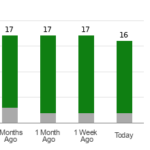A Dominant Force: Microsoft’s AI Endeavors
As the market euphoria around artificial intelligence (AI) stocks continues to captivate investors, the emergence of tech behemoths like Microsoft (MSFT) as AI frontrunners cannot be overstated. With a legacy dating back over five decades, Microsoft has weathered tumultuous business cycles, asserting its dominance as a multinational technology conglomerate renowned for iconic products like Windows, MS Office, Azure, and Xbox.
Despite its colossal $3.08 trillion market cap, Microsoft has displayed remarkable agility in the AI space. Boasting a YTD stock surge of 10.6% and a promising dividend yield of 0.72%, the company’s resilient financials underscore its stability and growth potential for investors.

Microsoft’s recent fiscal performance further solidifies its AI prowess, with a revenue spike of 15.2% in Q4 and an impressive EPS growth of 10% year-over-year. Notably, the company’s focus on AI is underscored by hefty investments, including a $19 billion capex allocation in the domain during Q4.
Moreover, the integration of AI solutions like Copilot and Azure AI has catalyzed a 60% surge in customer acquisition, reaffirming Microsoft’s commitment to innovation and customer-centric offerings. Analysts project robust forward revenue and EPS growth for MSFT, with a “Strong Buy” rating reflecting a 20% upside potential.

Oracle’s Resilience Amid AI Landscapes
Oracle (ORCL), a stalwart in the tech arena since 1977, commands a market cap of $380.5 billion and has carved a niche in enterprise software, cloud computing, and hardware services. Despite its seasoned presence, Oracle has faced recent challenges in aligning its fiscal performance with market expectations.
While ORCL’s YTD stock surge of 31.9% and a dividend yield of 1.16% project stability, its fourth-quarter results fell short of anticipated benchmarks. Despite a 3.3% revenue uptick to $14.3 billion, Oracle’s EPS dipped by 2.4% year-over-year, marking a deviation from its consistent track record.

Nevertheless, Oracle’s resilience in the face of evolving AI landscapes is evident through its cloud services segment, which witnessed a commendable 9.2% growth. Despite the recent earnings blip, Oracle’s steadfast commitment to innovation and technology evolution remains a cornerstone of its long-term strategy.
Exploring Oracle’s Dive into AI Innovation and Lucrative Contracts
Financial Growth and Stability
In the fiscal year 2024, Oracle experienced a significant revenue increase, reaching $18.7 billion compared to $17.2 billion in the previous year. Moreover, the company witnessed a surge in free cash flow, soaring to $11.8 billion from $8.5 billion. Markedly, at the close of the quarter, Oracle boasted a healthy cash balance of $10.4 billion. Despite this, Oracle’s debt levels stand high at $86 billion, albeit most of it is due in more than five years.
Innovation in AI
One of Oracle’s key strategic moves involves delving into Artificial Intelligence (AI) innovation by training models directly on customer data within their existing infrastructure. This approach enhances privacy, security, and accuracy by bypassing the need to transfer sensitive information to the cloud. Notably, Oracle’s competitive edge lies in its adaptable cloud network, resulting in lower costs for its clientele. This has culminated in attracting some of the most prominent AI firms to utilize Oracle’s cloud services and data centers, as mentioned by CEO Safra Catz.
Lucrative Contracts and Partnerships
Oracle has successfully secured significant contracts, including a notable $10 billion deal with Elon Musk’s xAI startup, indicating Musk’s interest in utilizing Oracle’s cloud servers for an extended period. Additionally, Oracle has recently engaged in partnerships such as the collaboration with the data analytics company Palantir to provide AI solutions to various sectors.
In another strategic move, Oracle inked an agreement with OpenAI, thereby expanding its cloud capacity despite OpenAI’s existing ties with Microsoft and their utilization of Microsoft Azure. Furthermore, Oracle has integrated generative AI features into their Fusion Cloud Applications Suite, offering a range of tools across multiple domains built on the Oracle Cloud platform.
Analyst Projections and Market Performance
Analysts foresee a bright future for Oracle (ORCL), predicting robust earnings growth ahead. The average forward EPS growth is estimated at 21.29%, significantly surpassing the sector median of 6.98%. While Oracle seems undervalued in terms of projected earnings growth, it still falls short compared to industry giant Microsoft, whose earnings per share are in a league of their own.
Overall, analysts hold a “Moderate Buy” rating for ORCL stock, with a mean target price of $149.64, indicating a potential upside of approximately 7.5% from the current levels. Among the 29 analysts covering the stock, 17 advocate a “Strong Buy” rating, while the remaining 12 maintain a “Hold” rating.






